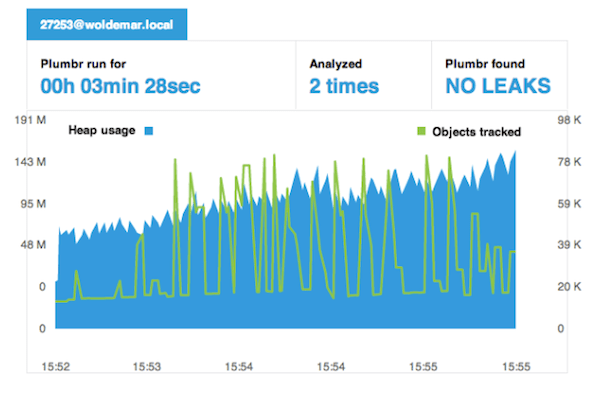Chalk this up as another Estonian startup to watch. Founded in late 2011 off the back of a PhD research project, Plumbr has developed a memory optimising tool that it claims can predict and avoid software failures. It already boasts paying customers such as HBO, Dell, NATO, TeliaSonera, and Ericsson.
The company has just closed a $1 million seed round led by angel investor Matt Arnold, along with Sten Tamkivi, who is the former head of Skype Estonia, and founders of global mobile-payment firm Fortumo.
Targeting companies that run or develop business critical software systems — think banks, e-commerce sites, and product development companies — its technology aims to solve the problem whereby programming errors invisible to the eye cause performance problems on live servers. These usually require hours, if not days or weeks, of manual troubleshooting after the app has crashed. To counteract this workflow, Plumbr says it’s invented an automated way that uses machine-learning to detect these errors before they start causing harm or showing up on trend lines.
Customers download and attach the Plumbr agent to their application and it starts gathering data which is analyzed by the startup’s cloud-based solution. Then when Plumbr finds anomalies (e.g. one component that uses memory completely different from the rest) it studies the differences and uncovers a root cause. For the end-user, any detected anomalies are available in a human-readable report that outlines the faulty lines in the source code and explains how to fix them. Finding a problem takes on average 70 minutes, apparently.
As well as a SaaS offering, the company also has an onsite solution for enterprise customers that doesn’t require a connection to its servers.
Plumbr co-founder and CEO Priit Potter tells TechCrunch the new capital will be used to “boost” product development, and to build the startup’s sales team and processes.
“We are picking the first fruits of our invention, but can further develop it to file for 1-2 patents every year from now on,” he says. “We only hired the first sales guy 2 weeks ago, most of our sales thus far have been led by customers”.
To date, the company claims over 100 paying customers who have detected more than 3,500 memory leaks in their IT systems, and says it expects to at least double its customer-base in 2014.
Potter says that its customers have already saved “millions of dollars in man hours, infrastructure cost and additional revenue”. That certainly seems plausible given that larger companies specifically employ performance engineers dedicated to solving and preventing the types of errors that Plumbr aims to negate, and that anytime a live server topples over, money is left on the table.
